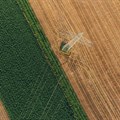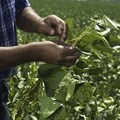Adopting key technologies to enhance agricultural production and sustainably intensify food production, has been noted as a crucial enabler for the continent's developing agriculture sector. According to SAP Africa's Dr Gilbert Saggia, "technology is being touted as the enabler of a new era of African agricultural prosperity. The exciting world of possibilities offered by blockchain, IoT, machine learning and the like have made companies, governments and policy makers sit up and take notice of how such technologies can be applied to foster greater innovation, efficiency and economic and social progress."
We chat to Simon Carpenter, Chief Technology Advisor for SAP Africa, for some insight into the state of technology-led agricultural transformation in Africa.

Simon Carpenter, Chief Technology Advisor for SAP Africa
What work is SAP Africa currently doing in Africa?
SAP is working across the entire agribusiness value chain in Africa - from enabling small-scale farmers to improve their productivity and output, to helping large-scale commercial farmers improve the integration of farming and business systems, to using drone and satellite imagery to help farmers deliver precise interventions at exactly the point of need. And, of course, working with food manufacturing companies of all sizes to help them manage their production and distribution operations effectively and efficiently.
What does agriculture in Africa need right now?
Food security should be on everyone’s lips because achieving it is a multi-faceted challenge and failing to achieve it will stunt Africa’s economic development. At a micro level, poorly nourished people cannot learn or work effectively whilst at a macro-level, economic resources must be devoted to food imports depleting already strained currency reserves.
What Africa needs, across the board is insight and foresight. Whether that is government agencies getting a better handle on what crops grow best and where so that they can direct policy and investments or the individual farmer farming better and achieving better prices for her crops or livestock. Doing this requires data. Data from a multiplicity of sources that can be married and analysed and acted upon in such a way as to ensure that Africa’s agricultural productivity (which is poor in global terms) can be exponentially improved in the service of our rapidly growing population.
Dr Gilbert Saggia 28 Mar 2018
There are two areas that are of primary concern are the supply chain and water.
Today between 30% – 50% of all the food grown in Africa never reaches a consumer due to ineffective supply chain management. This is a tragedy given that roughly 230 million people in Africa are undernourished. It cannot be addressed simply by helping farmers to farm better but by looking systemically at post-harvest logistics and agri-processing activities and coordinating them far better by using information and communication technologies. This also represents an opportunity to beneficiate agricultural commodities which would not only create more jobs but also improve hard-currency earnings for many economies in Africa
The second aspect that warrants increased focus and investment is water management. Worldwide agriculture consumes about 80% of all freshwater. In drought-prone Africa, as Cape Town vividly illustrates, this represents a significant challenge to food security and our daily lives. At SAP, we are already seeing how the use of IoT and big data can enable precision agriculture that utilises much less water and yet achieves better yields.
Not only can we apply more precise amounts of water to crops but we can also manage the water infrastructure better so that both water and energy losses are minimised across bulk water and irrigation systems. Using sensors to monitor flow rates and pressure at different points along a water network we can use advanced analytics to automatically determine whether there are leaks or theft occurring and workflows and mobile devices to raise the appropriate alarms to the right people. Similarly, by monitoring measures such as temperatures, vibrations and metal particulates in oil, we can spot patterns that predict failures in pumping equipment and thus schedule maintenance before a failure occurs to ensure continuity of supply and to protect service level agreements.
Lastly, by combining moisture data from soil sensors with satellite imagery and weather service data in so-called big data projects we can help farmers to irrigate their crops much more scientifically, thus, not only saving precious water but also reducing the energy costs associated with pumping water – farming with a pipette instead of a bucket.
What is happening in African agriculture right now that excites you (if anything)?
We are very excited by the positive response to and results from the SAP Rural Sourcing Management solution which not only helps small-scale farmers to achieve more but also helps producers to plan their supply chains better whilst consumers benefit from greater certainty as to the provenance of their food purchases. It is a great example of how to build inclusive solutions that benefit multiple stakeholders and improve agricultural productivity across our continent
We’re also excited by the speed and commitment that all stakeholders in the agricultural value chain are showing towards digital transformation and technology-led innovations in large-scale operations where more capital intensive farming and manufacturing operations can also be improved through better analytics and faster responses to prevailing conditions and events.
What game-changing technologies are currently entering the African agriculture industry?
Artificial intelligence and machine learning - when combined with satellite and drone imagery, the internet of things and spatial analytics - are revolutionising how accurately farmers can treat and their crops and optimise harvesting. SAP recently completed a proof of concept with a large-scale palm oil grower where we applied AI to drone images and automatically created a digital twin for every tree in multi-thousand-hectare plantations – opening up the potential for much more precise crop protection and tree care.
What is the pace of digital transformation in African agriculture? What can be done to speed it up and why is it important that we do?
Measured by output per hectare we are still well behind the rest of the world but at the same time, we can learn from and even leapfrog the rest of the world. At SAP, we are excited about the fact that we can bring a world-class technology platform to Africa and then work with local partners and agricultural experts to build solutions that are fine-tuned for Africa’s needs. In this way, we not only contribute to food security in Africa but also create high-quality job opportunities in the ICT sector and especially when it comes to driving digital transformation across the agricultural industry.
Of course, we cannot do this on our own. It requires a network of partners and governments that understand the potential of technology when combined with progressive policies and regulatory frameworks and a collaborative mindset across agribusiness networks.
What does the investment environment look like at the moment, are investors still positive about Africa and opportunities on the continent?
Taking ourselves as a case in point, there is a high level of interest and positivity about making a real contribution to Africa’s upliftment and competitiveness and the opportunities to create value in Africa. Leaders of every stripe know that Africa’s “demographic dividend” will only be realised if, inter alia, its population’s nutritional needs are met and its agricultural potential is maximised to drive economic growth. There is much work to be done but we are encouraged by the trajectory we see across Africa.






























